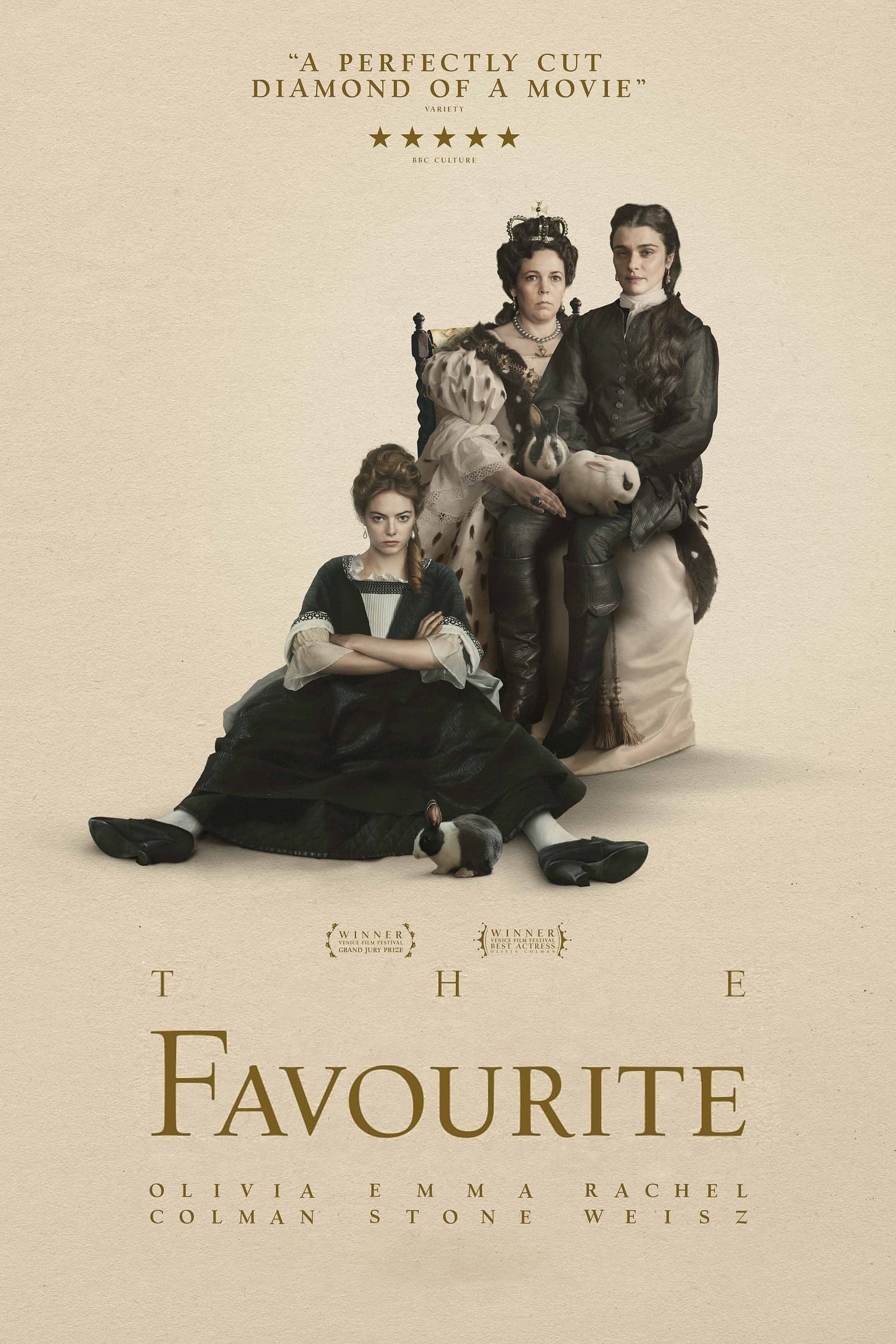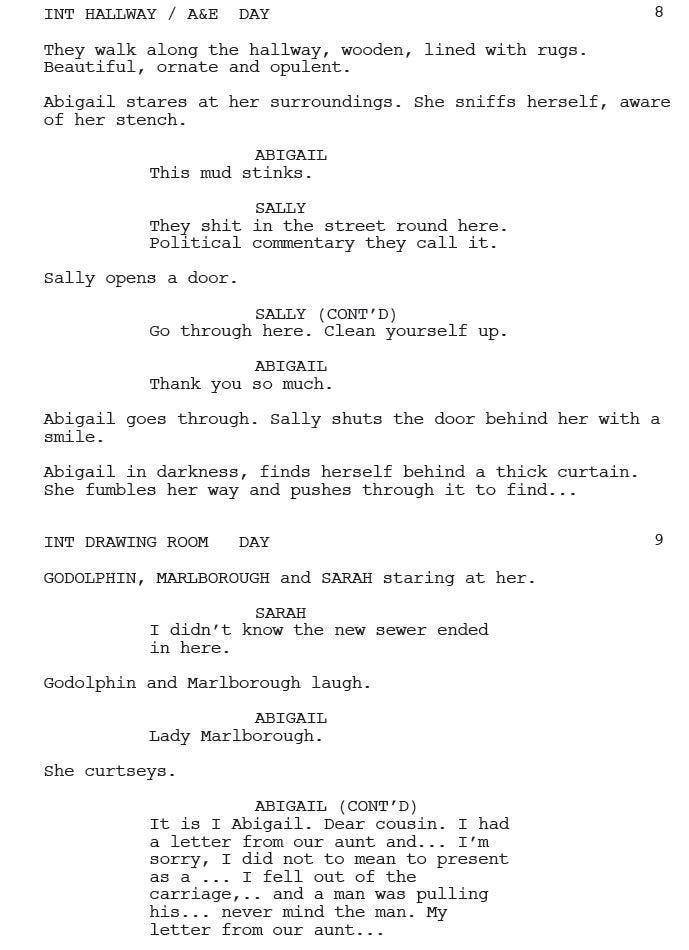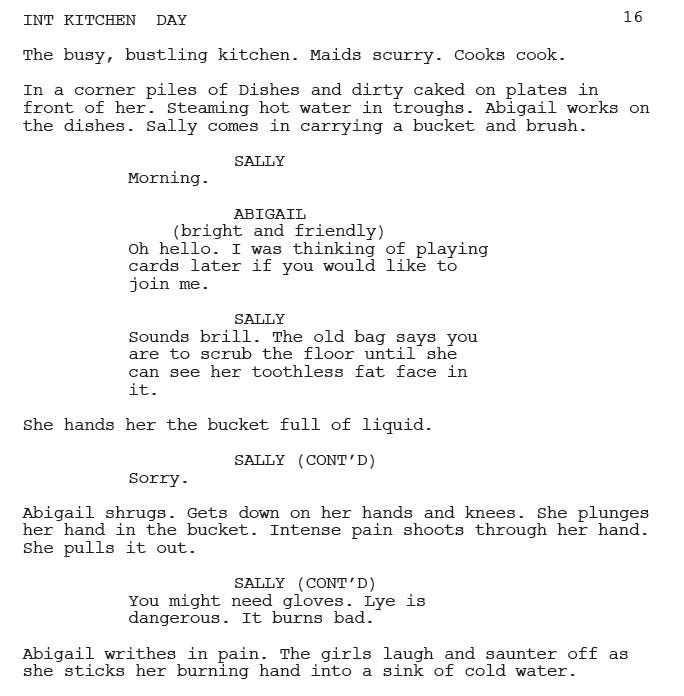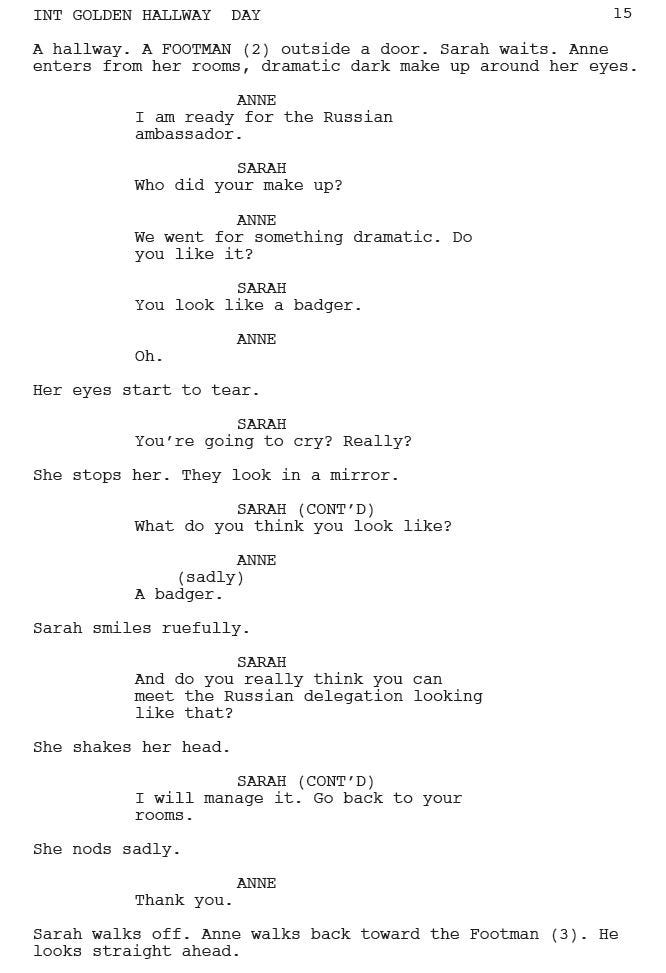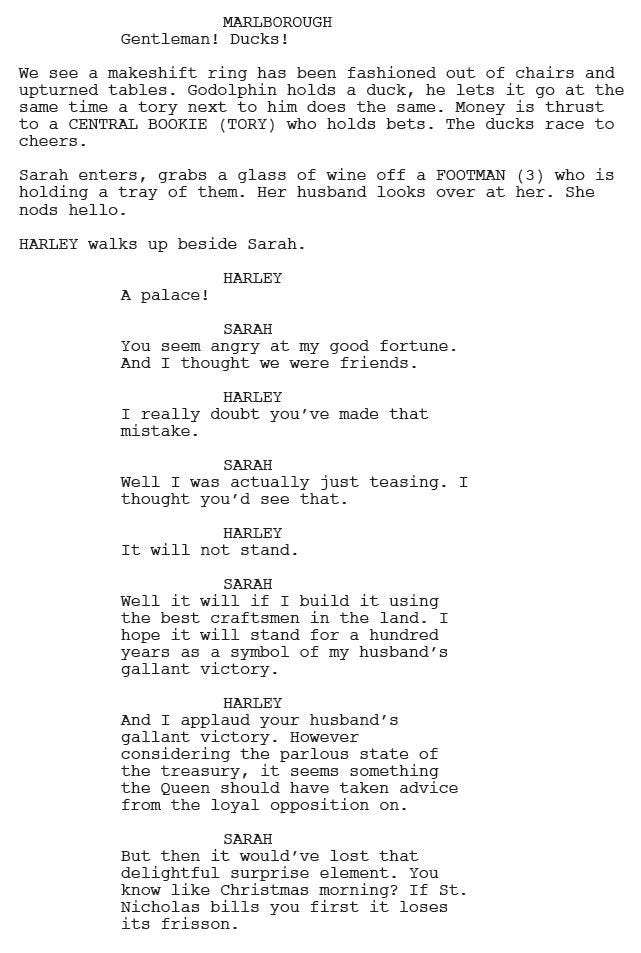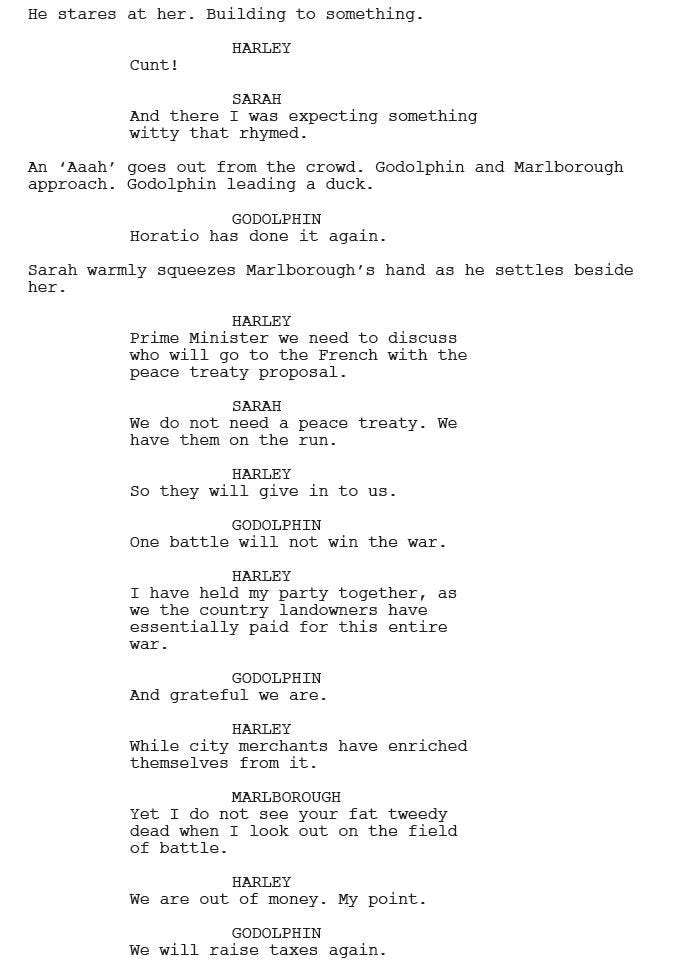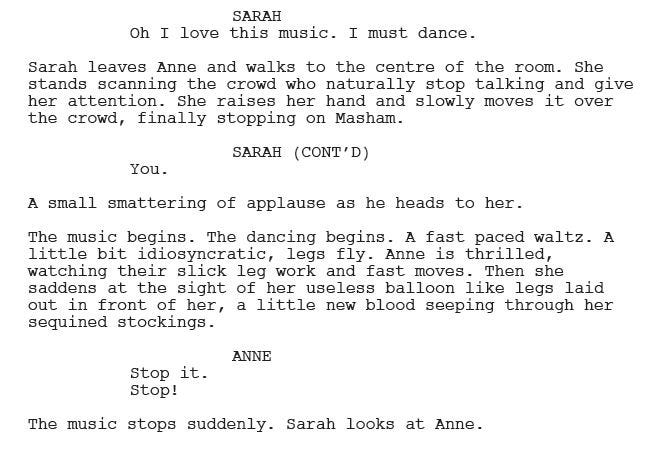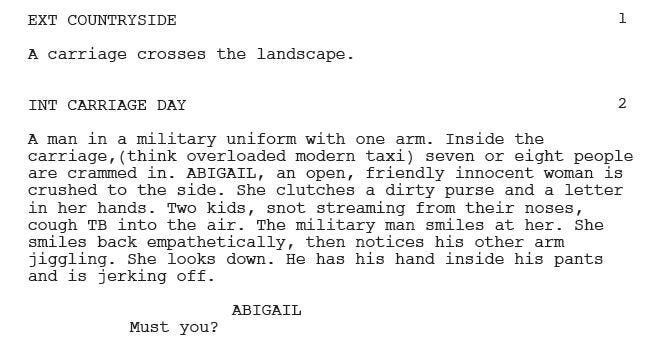The Favourite (2018) Script Review | #45 WGA 101 Greatest Scripts of the 21st Century
A tale of power, sex, and love set in the 18th century that is most certainly NOT your grandmother's English period piece.
Logline: In 18th century England, the close relationship between Queen Anne and Sarah Churchill is threatened by the arrival of Sarah’s cousin, Abigail Hill, resulting in a bitter rivalry between the two cousins to be the Queen’s favorite.
Written by: Deborah Davis and Tony McNamara
Pages: 102
The Favourite dispels the belief that period pieces have to be squeaky-clean and absent of vice. Yes, there are costumes and historical figures; there’s also a healthy dose of sex, violence, depravity, and swearing thrown into the mix. This is certainly not your parents’ period piece.
The events take place sometime during the 18th century. England is in its Stuart period and trouble is brewing in the court of Queen Anne. The English have the French on the run— the Tories, led by Robert Harley, want to sue for peace and end the expensive war; Sarah Marlborough, who practically calls the shots in running the country, wants to continue the fight and beat the French into complete submission.
Into this political intrigue enters Abigail. A cousin of Sarah’s, Abigail is desperate for work after her father ruined the family by spending everything. For a former lady, being a scullery maid is humiliating; it doesn’t help that another servant, Sally, is determined to torment Abigail at every chance she gets.
Another example:
Unable to bear it, Abigail is determined to regain her former status. Winning favor from Queen Anne by easing her gout with herbs, Abigail soon claws her way up the ladder, sparking off an intense rivalry with Sarah as they jockey to be the queen’s favorite, both in power and in her bed.
Although it features real historical figures, did any of this actually happen? Put it this way: while it is based on factual research, the script plays hard and fast with the interpretation. Whether Queen Anne and Sarah Marlborough (the ancestor of Winston Churchill) really did have a more-than-friends relationship is uncertain. What is certain is that all three characters- and others, like Harley and Samuel Masham- did exist; and Abigail did supplant Sarah as the queen’s favorite. That much is known.
The A-plot revolves around the battle between Sarah and Abigail, while the B-plot explores the impact on the characters and the nation. It is also worth noting that the female characters have more depth and development than the male characters— a rarity, since it is almost the other way around. They are flawed, they are ruthless and ambitious; Sarah could go head-to-head with other famous anti-heroes like Tony Soprano or Don Draper, and even emerge on top. Abigail’s motives stem from an insecurity about having to survive on the street or being forced to live a life as a servant; Sarah’s motives stem from truly wanting the best for England and her steadfast love for Queen Anne. She may not be as accommodating as Abigail and can be brutally blunt, but Sarah is always looking out for the queen— nowhere is this demonstrated better than the scene in which Sarah is less than flattering about Queen Anne’s makeup.
One of the most delightful aspects about this screenplay is the dialogue. It is spiky, witty, and charged. It sings when the characters clash and even when they are tender. It makes you laugh, it makes you smile, and it even makes you sad.
The writing, too, is economical with its words and description. Scenes that would take minutes are summed up in a few lines…
… while the script ultimately clocks at a surprisingly short 102 pages without losing any steam or power.
Now some might be scandalized by the script’s more R-rated elements. After decades of family-friendly BBC period pieces and Downton Abbey, the idea that the past could be debauched and raunchy can come as a shock. There’s a tendency to sanitize the past when, in fact, the past was as depraved and smutty as today. To borrow a quote from The Holdovers: “Each generation thinks it invented debauchery or suffering or rebellion, but man’s every appetite and impulse, from the disgusting to the sublime, is on display right here, all around you.” Prostitution has existed from the time of Jesus Christ (hello, Mary Magdalene!) and rich people have always done odd things in the name of amusement.
Perhaps any outrage we feel, then, says more about our values than historical authenticity. Speaking for myself, I find it bracing; in many ways, it feels both contemporary and timeless. The opening scenes in which a one-armed soldier publicly masturbates in a public carriage; and scenes liberally dropping less-than-polite words like “shit” or “cunt” all set the tone for what to expect.
The Favourite began as a screenplay as early as 1998. Deborah Davis, who had no formal screenwriting experience (and attended night school to learn the craft), had always loved stories about queens and the Royal Family. But when she stumbled across a local evening paper discussing how Queen Anne’s relationship with Sarah was well-known at the time, Davis was struck. She dived into the research—combing through historical accounts, Winston Churchill’s memoirs, and Sarah’s own memoirs and letters. She wrote the script on spec under the title ‘The Balance of Power’ and showed it producer Ceci Dempsey.
Dempsey was interested but was not ready to take it until the early 2000s. During this time, Davis continued to refine the screenplay. But when Dempsey finally shopped the script around, studios unsurprisingly balked. Why unsurprising? Why, because it lacked lead male characters and had a female love triangle! Scandal!
In fact, it wouldn’t gain any traction until around 2010, when Ed Guiney, co-founder of Element Pictures, got his hands on the script. He recognized its potential right away, but wanted to make it “contemporary and relevant and vibrant,” instead of playing it straight and running the risk of being compared with Stanley Kubrick’s Barry Lyndon. And he knew just the right person for the job: a European filmmaker making waves at the time called Yorgos Lanthimos.
It was Lanthimos who helped shape the script closer to the satire it would become. The drafts by Davis were more dramatic, and he and Guiney both wanted it to have more of a satiric bite. Lanthimos had just finished reading the pilot script for a proposed series called The Great about Catherine the Great, penned by Australian writer Tony McNamara. (Ironically, McNamara’s pilot would only get picked up after the success of The Favourite). Finding the pilot’s cheerful irrelevance and tone to be exactly what ‘The Balance of Power’ needed, Lanthimos hired McNamara to conduct rewrites. Although Davis and McNamara didn’t write together, they both found ways to complement the vision that Lanthimos had in mind, one that was both comic and tragic; a hybrid of old and new.
The results speak for themselves. The Favourite screenplay won the BAFTA Award for Best Original Screenplay and was nominated for the Academy Award in the same category. One imagines Davis and Dempsey felt vindicated by the accolades after nearly twenty years of rejection for being different.
And different is putting it mildly. The Favourite is ultimately a raucous and rambunctious story about three women who aren’t polite about what they want and aren’t polite about the lengths they will go to get it. Fashion goes out of style; politics change; every century has its share of marvels and problems. But love, power, and women wanting others say they can’t have? That’s timeless. In these pages, the effect is electrifying.
Notes:
Tangcay, Jazz (November 05, 2018) | Deborah Davis Talks To Awards Daily About The Favourite’s Twenty Year Journey To The Big Screen (Awards Daily)
Utichi, Joe (February 13, 2019) | How Tony McNamara’s Hulu-Bound ‘The Great’ Landed Him ‘The Favourite’ And An Oscar Nomination (Deadline)

